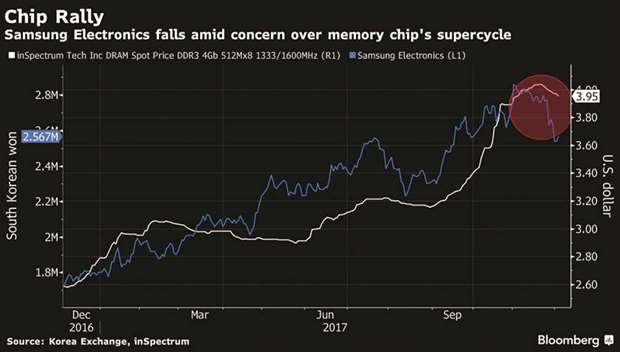As foreigners dumped Samsung Electronics Co stock this year, the South Korean funds that stuck with the technology giant reaped a 41% rally. For all that, local investors say the trade of 2018 is to chase the offshore money.
Small caps are the best bet in Seoul next year as the broader profit outlook in the $1.4tn Kospi market dims, say investors from Midas International to Mirae Asset Management. Overseas funds already made that call, pumping 2.7tn won ($2.4bn) into the smaller tech-focused Kosdaq gauge in 2017 and selling a net 5.6tn won of Samsung shares.
“There’s a question on whether Samsung Electronics can continue to show earnings growth as much as it did this year,” Heo Pil-Seok, chief executive officer at Midas International, whose Midas New Growth Company fund is up 35% year-to- date, compared with 21% for the Kospi. “If people think there’s nothing more to gain from large caps on the Kospi, they might move money into midcaps and Kosdaq stocks.”
Here’s a summary of the small caps that funds are favouring, and the arguments for and against holding Samsung.
Healthcare: The healthcare industry has “the biggest potential” for growth in Asia, said Kim Jae-Hyun, a fund manager at Mirae Asset whose healthcare fund made 64% in the past year. “In 2018, some healthcare companies, especially those that can export their technology, could be targeted,” Kim said. Celltrion Inc, which soared 81% this year, produces FDA-approved drug Remsima, a biosimilar of Johnson & Johnson’s blockbuster Remicade.
Cosmetics: At Fidelity International in Hong Kong, fund managers have been reducing holdings in large-cap cosmetics stocks that rallied this year as tensions eased between South Korea and China and reallocating money to smaller original design manufacturer-based cosmetics names, according to Medha Samant, investment director in Hong Kong. Korea Kolmar Co, an ODM-based cosmetics maker, gained 28% this year, compared with large-cap AmorePacific Corp, whose shares have stayed flat. “We are quite positive” on Korean cosmetics, but “valuations have gone up,” Samant said, citing the 35 times price-earnings ratio of AmorePacific Corp. “Our analysts are saying that at this point of time, it’s hard to justify multiples returning to historical highs.”
Sam Le Cornu, co-head of Asian equities at Macquarie Investment Management in Hong Kong, said Korean healthcare and cosmetics companies are “very-high quality and robust in terms of their margins and earnings power.”
Samsung debate: Cornu at Macquarie says the DRAM chip market is in good shape. Samsung is the major player in that space. “We don’t think DRAM prices or DRAM margins have peaked just yet,” said Cornu, who declined to comment on single stocks.
“Margins are very healthy. And demand is still quite robust from big data centres and services. But it is a function of supply and demand so it will peak at some point,” he said. Cornu’s fund has returned 36% this year, according to data compiled by Bloomberg.
Avo Ora, a London-based portfolio manager at Pictet Asset Management whose Asian equity fund returned 43% so far this year, is positive on the company over the long term. South Korea’s technology stocks will rise in 2018, he said, adding “we are just at the beginning of a long-term cycle.”
Still, Shawn Kim at Morgan Stanley downgraded his recommendation on the stock to equal-weight from overweight November 27, citing an expected peak in the memory chips cycle and a slowdown in growth at its smartphone business.
A majority of its Asian fund managers are underweight on Samsung, because of the trough in the smartphone industry’s cycle and rising competition from Chinese rivals, said Fidelity’s Samant.
At DB Asset Management in Seoul, Seung-Hoon Lee said he still believes technology stocks including Samsung will lead a rally in the Kospi again in 2018. “The number of suppliers is limited while demand is diversified amid increasing investments from China,” Lee said.
Until a new player appears on the supply side, the “oligopoly held by the current makers will be hard to break,” he said.

.
